One adds and the other subtracts
Gerhard Behles and Robert Henke on Ableton
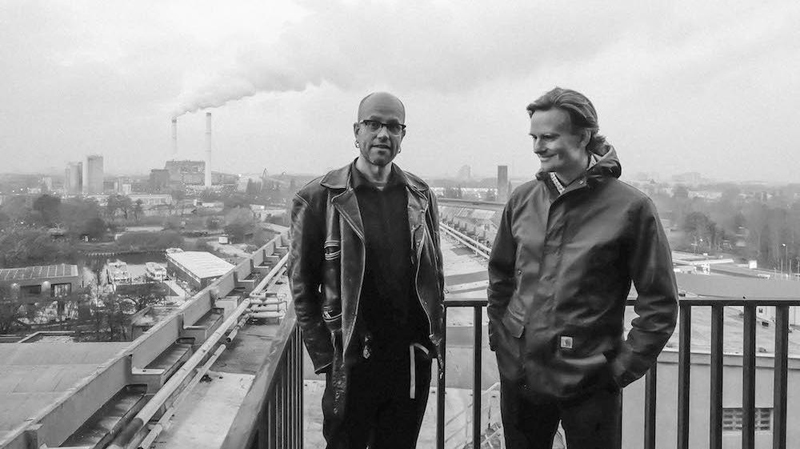
The following interview was conducted by Maya-Roisin Slater [link] for Thump magazine during the Ableton Loop conference in November 2016 in Berlin. It was the first interview ever with Gerhard Behles and Robert Henke about the history of Ableton. The version published at Thump was only a short excerpt of the complete session. Here is the complete interview. Some slight additions and corrections have been applied for clarity and precision. They are in italics in brackets. Photos on this page: Maya-Roisin Slater, Ulf Bueschleb, ?
Maya-Roisin Slater: So who are you and what do you do?
Gerhard Behles: I’m Gerhard, I used to make music a long time ago with this guy [points to Robert] and then somehow got diverted into running this [Ableton] business.
Robert Henke:
Well I used to make music with that guy [points to Gerhard], and at a quite historical moment I had to make up my mind if I would want continue doing that [making music instead of joining Ableton 100%], and I decided to continue doing music. But I’m also still involved with Ableton - and I do music! And since a few years also more and more visual- and audiovisual installations.
MRS: So you met at the university in Munich, is that true?
RH: Before university. We had a common friend who played a very essential role because he was running a shop that sold electronic music instruments. [The Munich branch of the legendary ‘Synthesizer Studio Bonn’]. And this shop turned out to become a hub for electronic musicians and there we both met.
MRS: So from the moment you met, did you know you wanted to work together and make music?
GB: No! We hated each other!
MRS: You hated each other?
RH: Yes! Absolutely.
*laughter*
GB: We really didn’t get along at all in the beginning. But then we lost sight of each other because I moved to Holland, and he moved to Berlin. Then I moved to Berlin too, and I was sitting one day in the university…
RH: At the introduction lecture!
GB: At the introduction lecture. And the professor says how it’s all going to work and asks what are our questions and I hear this voice behind me, someone asking a question and I go “Ugh! No! That’s Robert! He’s here!!!?”
MRS: What did you not like about each other in the beginning?
GB: This is getting too personal.
*laughter*
RH: We came from a very different background and, actually it’s a good question because later we figured out we have a lot of things in common. But on first sight we only saw the differences.
MRS: What are those different backgrounds? Where you were brought up or your just your ethos?
RH: To paint a totally cliche picture, I was at that time the kind of totally lost goth punk person. And Gerhard pretty much looked the same as he did now...
*laughter*
... nice white scarf and a very stable demeanor. Like the type of people I hated at school.
MRS: So you didn’t even really have to get into it, you just saw him and you were like, that’s not my people?
RH: Pretty much, yeah.
MRS: You meet again in university, and how do you reconnect from there? How did that work?
RH: Right after noticing that the other was there too, we ran up the auditorium to the exit and said: “What the fuck are you doing here?” And well the next thing you do is you decide you need to have some coffee to discuss that problem.
GB: It was the beginning of a wonderful friendship.
RH: Absolutely.
MRS: So what were you studying in university at the time?
RH + GB: Computer science.
MRS: Ok, so that’s basically where everything stems from. You became friends through mutual hatred of each other, and how did that become music? Like were you making electronic music already?
RH: Yes.
GB: I think something you have to know is Robert was always much more hands on than me. He had all kinds of gear collected and I always somehow lost my gear on the way. I think it was really through noodling with his synthesizers basically, we started to explore things together.
The key game changer somehow in hindsight: through more or less random connections we got in touch with and inspired by the Basic Channel people. And it wasn’t so much like: Now here’s your record deal! It was more that we were all just very inspired by what the other people did and it all came together.
RH: Also the technical university has a studio for electronic music, which was at this time one of those hubs for serious academic music. And we both owe a lot to this place, because we got introduced to a lot of electronic music that was outside the realm of club music. And also we had to do works there, we did installation works together and sound design and things like that.
And I guess along the way we noticed it’s actually fun to work together. Which I believe in part has to do with the fact that we’re different. Because we have different skill sets which very much matched with each other. So where I was always a bit too abundant, Gerhard was always a good person to get a certain order to things. And I think the beauty of our collaboration came from the fact that these two poles naturally work together. So we didn’t even talk much when we were making music, it just happened that we found a way to communicate via the instruments.
GB: That actually goes quite organically, and I would assume there are more couples like this where it works this way. Like you go to a [musician] friend’s house to hang out and get high or something and then you talk about what’s happening, what’s running on the sequencer. Then you say I think that’s great but.... And then you do something and that intervention triggers something new and then you kind of end up to getting music done, not even by intent and I think this is how we morphed into it. And I think I really like generally our dynamic of augmenting as your role, and reducing as my role. And I’ve also heard that happens with other people too. That’s one classic dynamic. There are a few classic dynamics between music creation couples, and that’s one. One adds and the other subtracts.
RH: What’s also important is that this collaboration became technically possible by a system we developed, a system of sequencers, a studio set up as an instrument which allowed us to find a very playful approach to composition, which is also one of the key elements of what later became the Ableton Live software. Because when you do things like that [treating the studio as a real time sequencing instrument] there are some specific limitations which we couldn’t overcome. In a way Ableton Live was the answer to our own problems. And I believe what made the software such a success, was the fact that it’s entire design was driven by a deep understanding of a certain need.
MRS: So in the beginning what equipment were you guys using to make music, like just synthesizers basically?
RH: Drum machines, synthesizers.
GB: And early on I think also [Cycling '74 / IRCAM's music coding environment] Max, like programming Max patches. I mean it helps if you know your way with tech, we were programmers, so...
MRS: So right from the get go, you were involving your computer science education with…
RH: Yeah I’d say so, that really helped.
GB: I think somehow the Max part outgrew the hardware at a point. Very much also for live shows. Because in the early nineties you could get away with playing one song over a whole night [using just a drum computer, one or two synths and effects], but that kind of working method got a little limited over time. So you ask how we can expand on this and create a little more variety and you quickly end up with somehow canning some [pre-recorded loops of existing] material and then [the question is] how do you deliver that? There you are, that didn’t exist and that’s how Ableton Live happened.
RH: I think of course all these developments can only happen at specific moments in time and there was just this historic coincidence that right at this point when we both became on a very local scale famous enough to be asked to perform live, laptops started to be powerful enough to actually do audio processing.
That was the Apple Powerbook G3, the first laptop with an acceptable sound card and enough CPU power to do at least a little bit of audio processing inside the computer. And this also lead to the development of an extension of the Max software we were using to program. [The extension was the 'Max Signal Processing' package, which turned Max into MaxMSP]. All these things just came together and suddenly it was possible to perform an interesting live set on stage with a laptop and nothing else. And that of course changed everything in a dramatic way, because as Gerhard said, we could do much more variety, much more radical means of expression without carrying around heavy racks of equipment.
MRS: Ok, so can you tell me about starting with Basic Channel and how you got involved with that and how it affected your music?
GB: I think we got in touch with Moritz [ von Oswald ]. I met him the same way as I got in touch with Robert, via the guy who owned the synthesizer shop in Munich. [Wieland Samolak, see also here] It’s like connecting the weirdest dots but that’s how it went. So I knew him through this, and somehow we got reconnected in Berlin.
RH: I mean one thing which is a bit hard to understand now if you look at it from an outside perspective, some twenty years later: the scene was very small. Which means you went to a club like Tresor, WMF or Elektro or whatever places were there…
...there are historic photos of the early nineties where at the same place, the same night you see several Berlin locals, plus Aphex Twin, and Richie Hawtin, and Jeff Mills, just hanging out there.
Because the scene was so small you eventually ran into everyone. And the other very, very essential part of Basic Channel, Mark Ernestus, ran the Hard Wax record store, and that influential place, which is still existing, was also a hub for a lot of other artists who were working with Basic Channel and Chain Reaction later.
So it became quite natural to be in touch with those people. And as another side development the Basic Channel guys also decided to build their own mastering studio [Dubplates & Mastering] and they were hiring engineers for the studio. And since I have a strong engineering background, I ended up being a mastering engineer in the very beginning. So there were just multiple ties.
And at some point, I think in 1995, Mark and Moritz decided they would be interested in creating a deliberate sub-label of Basic Channel to collect all the interesting people in this environment, basically all the friends they knew whose work they found interesting, and really more or less by accident we got our first record contract.
[The label was called Chain Reaction, the first Monolake 12", Cyan, came out as CR-04]
GB: Really also in hindsight a very impressive move on their part. I mean they really wanted to foster the community, they helped a lot of people…
RH: Absolutely.
GB: ...who otherwise would’ve never released stuff. They were really so supportive, and I mean cute about it, too.
I mean we played them our early trance acid crap, and were joking: “Who would like to put that on a record???!” and I remember Moritz said “I would have done it differently, but ok.” And it got released.
RH: I remember that situation. And sometimes you know retrospectively you would say maybe it would have been a good idea to not release that record...
*laughter*
MRS: You probably wouldn’t be where you are without it.
RH: No, no, this specific record is forgotten and that’s good…
MRS: Somebody is going to find it now for sure. So you’re talking a bit about the
scene in Berlin in the nineties, can you paint a more detailed picture of what was going on with electronic music when you guys were there?
RH: I mean there’s vivid colours and pictures of all kinds of things in my memory. One of the anecdotes which I find remarkable is, we used to go to a club which was run by an artist collective, the ‘Electro Music Department (EMD)’.
A project consisting mainly of two music producers and a visual artist. It was a very very small place but it became quite influential. Panasonic played there for instance very early on. And I believe that even their name came from the fact that at the entrance of this place was a big Panasonic sign because it was a former radio shop. And this was one of the places where you went to listen to music and to talk about it.
Because the distance between you and the DJ was just the bar. The DJ was standing right behind the bar, so ordering your beer and talking to the guy behind the turntables was one thing. And that always led to situations like me saying: “What is this?”, and him or her handing over the record cover and and I go “Oh, interesting!”
And I was living maybe 10 minutes by bike from that place. One Friday night I just finished a piece of music [this] and I really wanted to understand how this sounds in a volume which is louder than what I can do at 11 o’clock at night in my apartment. So I just grabbed my tape recorder and recorded the tape and ran with
it back in the club.
And Klaus Kotai from EMD who was DJing that night, I asked if he could put this on, and he just did. Because there was no risk involved. There were not 500 or 5000 people expecting the latest house tune, it was just an audience of 20 people, if that, interested in what’s happening.
GB: Maybe you could say on a more large scale I think the key difference was the whole realm of money didn’t exist…
RH: Actually not at all.
GB: In nobody’s mind [ at least in our closer community ] was there even a thought about it. And I think it was more driven by the seemingly infinite opportunity. Also in squatting, like basically half of the town deserted, and ready to be used for something like a club to be set up and then forgotten and moved on. There were so many years where that was the only thing that drove the whole scene and nobody had any advanced interest in earning money.
MRS: Which is so interesting, it’s very strange for me to think of electronic music as a DIY scene. I feel like usually you associate DIY scenes with punk music or rock music or stuff like that. Whereas now it’s so commercial, I mean it’s quite recent, but it’s so intensely commercial it’s hard to imagine it was ever something small. Now you go to a club and the DJs…
RH: ...like a god. There were lots of discussions in the early techno community about exactly that. How do you perceive yourself as a DJ, what is your role. And it was not only about: we are not interested in pop music as a format, it was not only about we don’t want a three minute track, we want something that is an endless continuum that we can get lost in. That was very essential, sure.
But it was also the idea that you get lost in music and the DJ is the person enabling that, but is not important. So in many of the early clubs there was no stage for the DJ, at Tresor, the early Tresor, the DJ was just separated by actually some metal bars, but played on the same level. At the Panasonic Bar, same level. At WMF Club same level.
It was never the idea that the DJ was someone you would look up to. And as an interesting detail people were also not dancing facing towards the DJ, they were facing towards each other.
You were looking at other people when you were dancing and trying to get some sort of social interaction either because you liked the music or because you like the person or both. But it was not that everyone was polarised towards the DJ. And this only happened at the later stage when clubs raised their entrance fees and invested in fancy light shows and big big parties came up, and suddenly you had the big stage again.
MRS: Another interesting perspective. Because DJs are pretty horrible to watch. Not always but most of the time, if you stare at a DJ playing, it doesn’t make any sense. Like they don’t want to be looked at. If you’re a DJ playing I can’t imagine you want 1000 people staring at you, like you’re trying to press buttons. It’s not a great performance art. But I guess the expectation now is you watch a DJ like you watch a band. You’re watching them, and they’re watching their laptop.
GB: I don’t know how it happened…
MRS: Well let’s fast forward now to the official founding of Ableton. You involved another person, how did the real official founding date happen?
GB: I ran into a guy called Bernd Roggendorf, and he was a music enthusiast but not a musician, he was a straight up software engineer and that was his career. He was like way more solid than us combined at that. And he just said let’s do it! We can do this, this is not too hard, it’s possible. Because he’s like a natural born optimist.
RH: Absolutely.
GB: He said let’s run a business we can do this, much more stupid people run businesses than we, we can do this. And somehow he got us to do it.
So when you were making Ableton originally, before it was Ableton, was there
always a thought in the back of your mind that you wanted it to be a product that you wanted to sell?
GB: I would say the turning point was really through Bernd. Because really what we did was only for our purposes, and sometimes only for one gig, or one piece. A program for a piece. I think the idea that this could somehow be generalised or be packaged more as a product that’s accessible to other people too became much more prominent with Bernd entering the conversation.
Also the technology was totally different at that point. [ There was nothing even close to Ableton Live out there. It was all based on the pardigm of using computers as replacement for tape recorders ] So that was a start. And also I think we lucked out in that Bernd pushed very hard that we need financing, we need an investor, otherwise this is going to be dragging along forever and it would be painful. And that also means you have to write a business plan, you have to fantasise at least about what it could become. Even if in the beginning you
really don’t believe in it, you have to project a theory to success. Having to force yourself into that kind of thinking actually paves a ground for it to actually happen.
But I would say in the year 2000 I would not have believed this [the incredible success of Ableton Live] could happen.
RH: Certainly not. I think the feeling we had was, that there are enough like-minded people in our closer community who could appreciate a product like this that it could work commercially. Just a feeling: you look at how many people make electronic music at this time, what are they struggling with, how much would they benefit from a product with a specific feature set. And that gave us confidence to believe that a small company could actually survive on the market.
No one thought of the thing exploding, we just thought we could survive. I remember when we went to the first trade show [NAMM in Anaheim, LA, the worlds biggest music instrument trade show] with the first version of Live, we felt very much like we were small innovators with a niche product, and actually we felt very comfortable there because we had other friends of small niche companies with a similar mind set and we also literally stayed in the same corner of the exhibition space.
So there were other big companies like Steinberg, Roland, whatever, and then in one corner there were the freaks and we were just part of the freaks and that was a comfortable position.
What happened during the first NAMM show, [2001, with a beta version of Live] on the second day or so, that moment where I really thought for me, there is something going on here: I was demoing the software to people. You know an unknown company with a strange product, a few people came by, but it was not already the world noticed the revolution was going to happen. At some point, a guy came by, just a typical LA music producer person, dark suit and kind of longish slightly greyish hair followed by maybe ten people in their early twenties who also looked like the classic cliche of the Hollywood composer.
RH: And I showed him the product and he had a german accent but I didn’t take care of that because at a trade show you meet all kinds of people and everyone has a badge, but I was so busy explaining to him what the product was all about, and he had a lot of intelligent questions. And at some point he asks, so you can just put in a drum loop here and change the tempo continuously from let's say 110 bpm to 140 bpm and it doesn’t change the pitch? And I said yeah, sure I can show you this. But I did it from 30 bpm to 999 bpm. And after that demo he just said: ‘do you have a card?’ So I handed him my material and only then did I get to read his name tag and it was Hans Zimmer.
Then he left and all the other guys behind him left too, and half an hour later, people showed up: ‘Hans told us you have something interesting to show here..’, and I really believe he was the first one who understood this piece of software could actually work in a completely different area than what we were assuming. And Ableton Live, already in the initial version had one very lucky property: At this time the workstation of choice for all the really professional studios was [ Digidesign's ] Protools, and there’s a specific protocol where you can
connect different applications to Protools and link these different softwares together, and this was called ReWire.
And we were smart enough to implement ReWire in our little product and that made it possible for the big guys in Hollywood to actually use the crazy software from Berlin and incorporate it in their work.
So that was the moment where I thought ok, perhaps we are completely looking at a too small segment of what could actually be done. And as you can see nowadays, I would say the people making techno with it, that’s probably a very small sub segment of the user base.
MRS: Gerhard, you eventually left the musical group. So I’m just trying to figure out chronologically in order what happened. So you’re happy together, you start this company, and then are you still making music when you start Ableton?
GB: I think the idea was we do this on top of everything and I think we upheld this illusion until it fell over.
RH: Maybe one month…
*laughter*
GB: I mean at some point you just go to the studio and, you just want to drink a can of beer [and not make music anymore]. And you realize, you don’t have the power to do both.
MRS: But you [Robert] continued on with it?
RH: It was a decision of mine which caused me a lot of struggle for quite a long period of my
life. Because I’ve always felt torn between those two ideas. On one side I tremendously enjoy
software development. I tremendously enjoy thinking about such things and creating something
that has its own beauty.
GB: I think it was easier for me because… I mean we’re both somehow hybrid between the
musical and the technical. But for me it was always clear that I would be more useful on the
technical side, on the engineering side. And I think for you [ Robert ] it was just
not so clear.
RH: I would say at this time I kind of felt 60/40, nowadays I would probably put it at 50/50.
Because sometimes I get much more satisfaction out of solving a programming task than of the
artistic side.
GB: I guess you’ve also found a different way of combining it because your work now is
intensity technical. The difference is it doesn't make a product for many people to use on
their own it’s an art piece. I think the uniqueness of it in many ways is, that there are
not so many people who can cover that ground between aesthetics and technicalities like
Robert can.
MRS: So how did creating Ableton as a company change your relationship? Because
you’ve gone from hating each other to a beautiful friendship and now you’re starting a
business with someone else in the picture. So how did things change??
GB: It’s complicated. These become complicated relationships in all ways, in all directions, on
all levels. I mean even when it comes to agreeing on the product and its many details of course
you have a debate. I think the start of a company generally is misconceived as a happy place.
The start-up is a shit place. It’s full of conflict. Heated conflict.
*laughter*
RH: Absolutely!
GB: Sometimes people pull it off and they find the third way, like: hey that decision here
is not mine or yours, but better than what either thought. But not always. It often can also
end up in a grind of compromise.
Also because you don’t go in it with a totally clear hierarchy. It’s not like you form a company
with three people and it’s equal footing, it isn’t like: this is how we’re going to make that
decision X..., it’s not the way it works. You just have to somehow figure it out. And you figure
out so many things at the same time, how are we going to do this process [managing the
company], and what’s that button [ on the interface ] going to look like, it’s
all in one. I remember it as entirely stressful, I mean exciting, but super stressful.
RH: Also, it’s not just having two people making decisions, it’s a whole group of people.
And some people are chosen because of their specific merits, but you wouldn't choose them as
your friends. But you work together on something that is so deeply touching the core of your
interest and so much of yourself, you can’t separate your personal desires and visions from
the product.
And then you have to accept that someone else has a different idea, and you have to negotiate
that in an environment with no stable hierarchy. That can cause all sorts of difficulties. The
funny thing is, if you read books about different companies, you have this in every single
company. It’s really funny! Every single story you read about the big companies: you look at how
people founded this place and how did they get along. Let this be Apple, let this be Microsoft,
whatever company. You read always the same stories and you can always recognise yourself in
those stories.
GB: Well I think it is ultimately not different from a family. These two people come
together, they’re have great sex, and now there’s a kid. Now what? The whole dynamic
changes. They have to figure it out and they don’t maybe know each other so well. They have
to figure it out like so many things at the same time under high pressure... I mean it’s the
same situation really.
MRS: So as the company has grown and gotten bigger have you both stayed involved in programming the software yourself, or are you less hands on?
RH: I officially left the company five years ago [2009] to focus more on music. It’s just that there’s a certain persistence in my personality that keeps me from letting go. That means I’m still
involved in an in-official level of talking to people, putting ideas in the pool and hoping that
the ripples in the ocean do not disappear. Or just having drinks and dinner with Gerhard to get
an idea of what’s going on and discuss things. When I was still at the office, I saw myself
responsible for certain aspects of the software, and I took great care that they develop as much
according to my ideas of quality or whatever you want to apply. [Robert's involvement with
the company became actually a bit more formal again in 2017 and much more formal and intense in 2023]
One of the reasons why this software became so good was because Gerhard for a very long time
was deeply deeply involved even in detail decisions. Some of our greatest fights and
struggles were about certain details and in retrospect you would not think of that as
essential. But then again we made sure that there was a certain consistency to this product
and one thing which I owe Gerhard and all the other smart people at Ableton, is the openness
and understanding for different concepts, different perspectives. And despite all the
struggles and despite all the arguments, the legacy of being able to create such a piece of
software together that’s an incredible gift to be part of.
Even, or actually because of the struggle and the need to defend ideas. I think this is a part
of the beauty of this whole process: you believe you have a great idea, and then you talk to
someone else who believes your idea is completely stupid, but at the same time you know this
person isn't stupid at all. Then things start getting really interesting.
MRS: I feel like with writing, I wish there was more of that. Especially if you’re
freelancing from home. If you don’t have a good editor then things can really go wrong.
Because it’s all your ideas, that’s the horror of working in a creative business: your
entire career is just your ideas. And if no one is there to screen your ideas then you can
easily justify things to yourself. So what are your hopes for the company going forward and
the software that you're making. What do you hope for Ableton to become?
GB: It’s like we’ve been metaphorically speaking buried in a computer screen for about 10 years
now and not looked much above it. I think this was good, because it needed a lot of focus and
very much attention to detail to get a stable core of what it is. And it’s also interesting
maybe in hindsight that it developed rather slow actually. I mean it’s still not as feature
bloated as a lot of the other programs out there, and I think that helped it catch on, because
people need to take the time to learn it and teach it and I think that all helped.
So we were entirely focused on this sort of ‘in the box’ experience. And at some point we
woke up more to the reality that this is changing the world, and well what do you do with
that?
And I feel a tremendous responsibility [about the impact the software could have for music
making in general but also for instance in education] so that we can move on in a good
direction. Because as this conference [Loop 2016, a conference lead by Ableton to bring
music makers, instrument builders, educators etc. together] shows, there’s a big impact
of the product and the brand and what we do, on a lot of people’s lives.
I guess creativity and that stuff has deep influences on people’s development, and we’re
trying to look at it in a much more holistic way now, this is how things like Loop come
together. You’re thinking ok let’s assume we can do everything, let’s assume we can write
software as well as put on conferences. Which is an entirely different beast and a set of
challenges, but it occurred to us, that we need to do this, this is really important.
And also hardware came into play in is a similar situation, it’s like you can only get to a
certain point with what you’re trying to achieve inside a computer and eventually it has to
materialise [e.g. as a hardware interface like Ableton’s Push] and that became an
important new leg of the business. And I’m now much more interested in looking at the impact
this has on people and what’s the maximum impact this can have on people that’s positive.
MRS: So you touched on it a little bit, but how do you think Ableton has changed electronic music?
RH: It has changed it quite dramatically, i’m very certain about that. But the question that is
extremely difficult to answer is: imagine how it would have been without, because we have no
clue. Maybe a competitor would have done the same thing or something very similar. Or electronic
music culture would have developed differently, we just don’t know.
What became very obvious is that the [Ableton Live] software enabled a lot more
people to leave their home studios, bedrooms, and go on stage. And that fuelled the whole
culture, that fuelled the whole festival culture. I don’t think we would have the same
amount of electronic music festivals these days without this software.
Because suddenly everyone who’s producing electronic music had a clear path how to bring this on stage. I
mean it became quite normal to go onto any festival stage and just accept the fact that
almost 90% of all laptops are running our software. I remember clearly for years this did
strike me as something completely mad. That I’m here and that everyone is using this
software, and occasionally people would come to me and say: Hey Robert, do you know how I do
this or that?
Well there were actually two phases. The first phase was that people would say ‘Hey Robert can you
help me?’ The second stage was that there were all these people playing before and
after me who didn’t have a clue that it was actually my instrument they were using. Which
actually showed how much it spread.
At the beginning I always had the urge to say: That’s mine! I did that !!!!! But I
eventually gave up on that.
*laughter*
GB: I think it’s true the first frontier of impact was actually live shows. That was huge.
And I think the second was producer's, more people doing it at all because I mean it is more
accessible proposition than the others at that point. I think the third one I would say is
education, again it’s a finding more than something that happened by design or intention,
seeing what people do with this in education. Nobody sits down and says we’re going to
change that, it’s the educators that change it, because they find this is a tool which
allows them to find a new kind of music education.
MRS: Ok so last question and then I’ll let you guys go. So you started the company
to solve a problem, so now that you’ve helped with that problem, what do you think is the
biggest problem or challenge that faces electronic music whether cultural or technical?
RH: In my opinion the problem is arbitrariness. Which means everything is possible, everything
is actually quite easy possible. Everyone is doing it and at the same time I feel to a certain
degree it lost its value. And that might be a pessimistic old guy's view driven by a wrong
perspective. But for instance if you go to an electronic music festival, it’s expected that it’s
an audiovisual project these days.
And if you go to a concert it’s even more than ever the expectation that you’re overwhelmed by large scale LED screens, lasers, lights, dancers. And what this means is, if you take all these additional elements out of the game and just listen to the music, very often I find it surprisingly generic and uninspired. For me this is a bit strange given that the technology allows for so much.
So in theory you could do all sorts of really really advanced things, but at the same time that’s at least for a larger audience obviously not desirable. So I’m a bit lost there for myself. I personally found my niche by doing my own audiovisual projects which made sense to me, but i just noticed that the impact
music, just music without anything else around it, to me became smaller. And I feel that if I
observe listening habits of people these days that might be the case not only in my personal
perspective. But I’m careful with this statement because I’m not sure how much this is my
personal mirror, my personal filter there, I don’t know.
MRS:Yeah, I was interviewing Tarik Barri yesterday and that’s something we were
talking about, how i think in the future there will be no electronic music without a [
potentially interactive ] visual element. I think the two are becoming the same
thing. So it’s interesting. And I was saying that with Versum [ Tarik Barri’s own
audiovisual software ], with interactive software like this, it forces people to
remember that they’re actually listening to something. I think many people forget they’re
consuming art at all. I was saying maybe having an interactive element will put people back
in it. Will force people to start participating in something that's actually happening as
opposed to seeing it as background noise.
GB: I would think the biggest challenge is that you have to get better at so many things at the
same time. Like if your theory holds you’re also going to have to be excellent at making
interactive video happen. And what more? Now in the last couple years if you think of what came
into the mix: you had to be really great at managing your social media, you had to be
entertaining 24/7, and be responsive to fans.
I mean hey, the people I looked up to, that inspire me musically, played behind a curtain because they were so elusive and so not excited about projecting anything as a person, they wanted to project through the music. That was hard enough, but all this stuff compounds the difficulty. And I just wonder what kind of personality and kind of education and mindset remains as this qualifies for your success in this field, it
becomes impossible.
RH: Well what you notice is, that to successful create a career in this multimedia music
business you actually have to build a sort of company. Because that’s what the successful
artists are these days. This idea of there’s the artist that is doing it, that doesn’t hold
anymore.
It’s teams, you know the agency booking the concerts and making the press
dates, and the production company producing the event, the guys doing the video clips, the
unknown visual artist team providing the visual content,… every successful electronic artist
on a large scale basically has to have this network of people working for them to deliver
that quality.
GB: Hmmm. But I guess the least common denominator of that whole conversation is that the single
biggest challenge is collaboration.
We have gone so far into unifying roles, and now we have to
go back and see ok how can you split that work, how can you build meaningful collectives that do
something together that still is one thing.
I think that is the biggest challenge actually. And it requires people to well develop the skill of collaboration, which, as we have talked before is not always easy, but I think it’s all about that.
Munich
Berlin
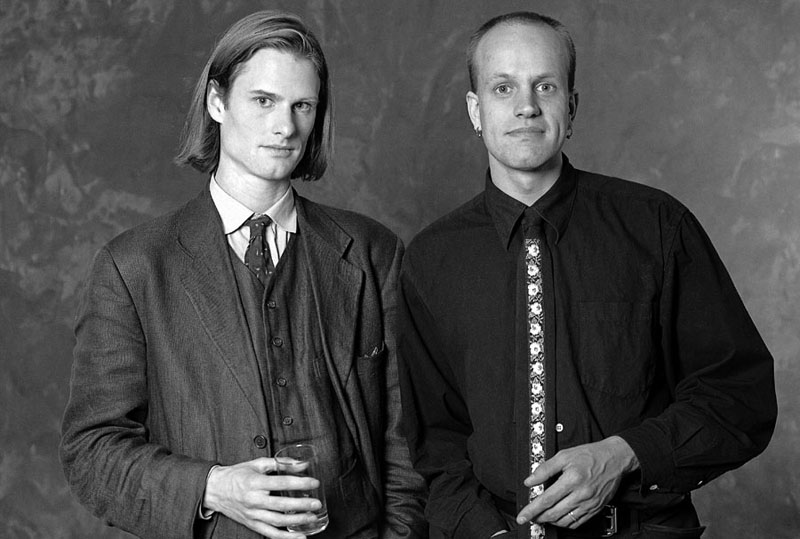 Gerhard Behles and Robert Henke in Berlin 1999
Gerhard Behles and Robert Henke in Berlin 1999
Computer Science
Basic Channel
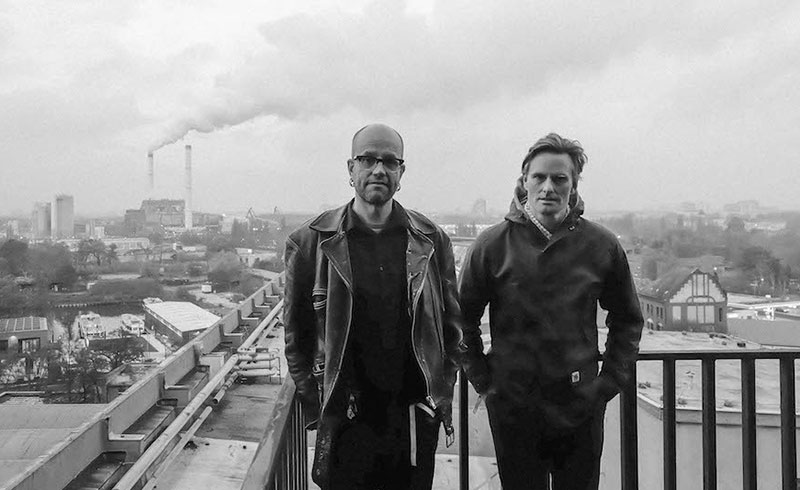 Robert Henke and Gerhard Behles in Berlin during Loop 2016
Robert Henke and Gerhard Behles in Berlin during Loop 2016
Friday Night at Panasonic
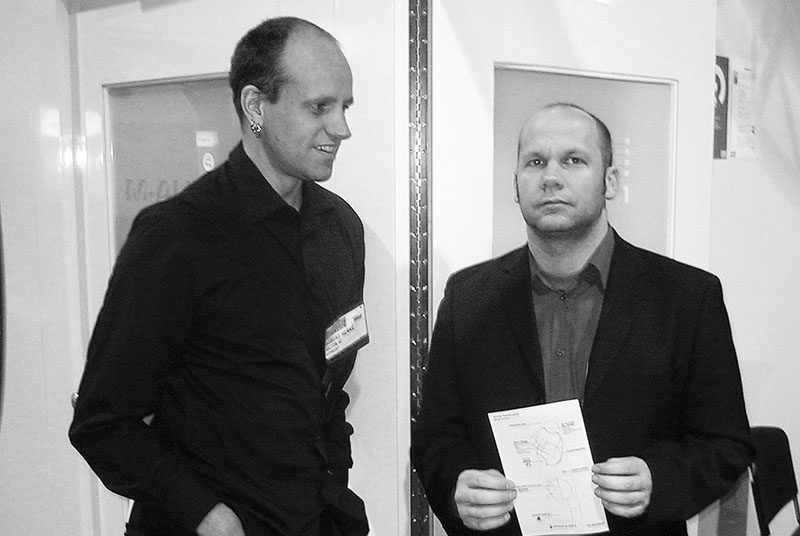 Robert Henke and Bernd Roggendorf at NAMM 2004(?)
Robert Henke and Bernd Roggendorf at NAMM 2004(?)
NAMM Show 2001
Hollywood
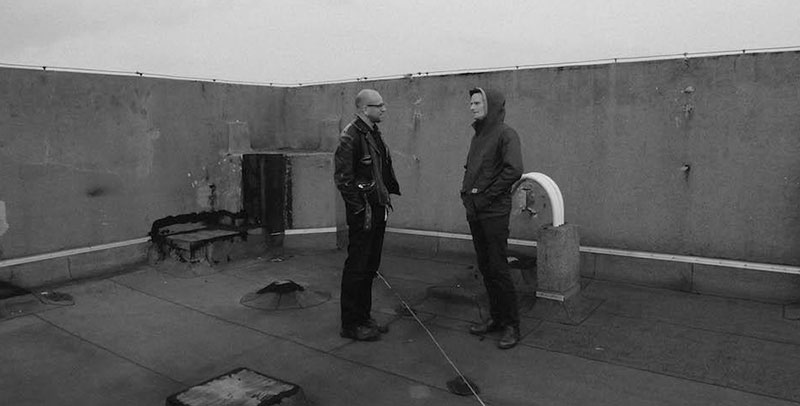 Robert Henke and Gerhard Behles in Berlin during Loop 2016
Robert Henke and Gerhard Behles in Berlin during Loop 2016
Post Monolake
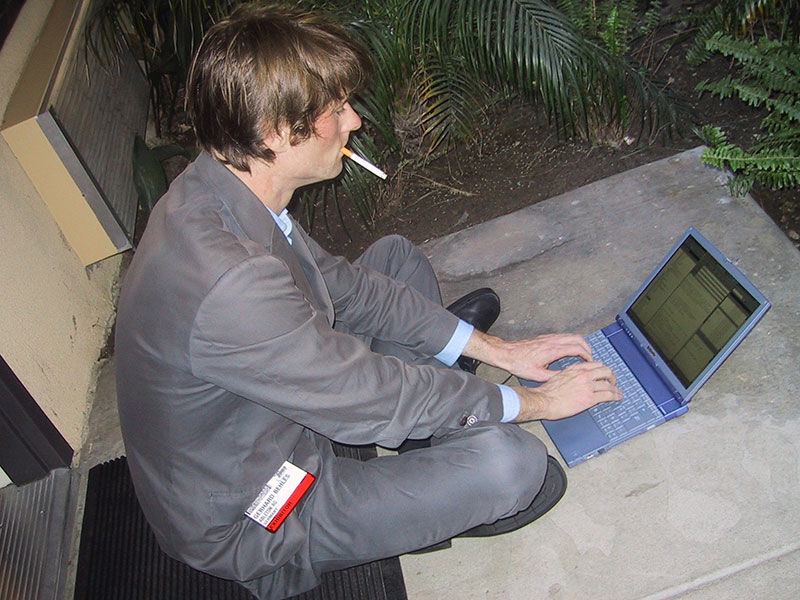 Gerhard Behles in front of motel in Anaheim, LA, during NAMM 2001
Gerhard Behles in front of motel in Anaheim, LA, during NAMM 2001
Distance
Impact
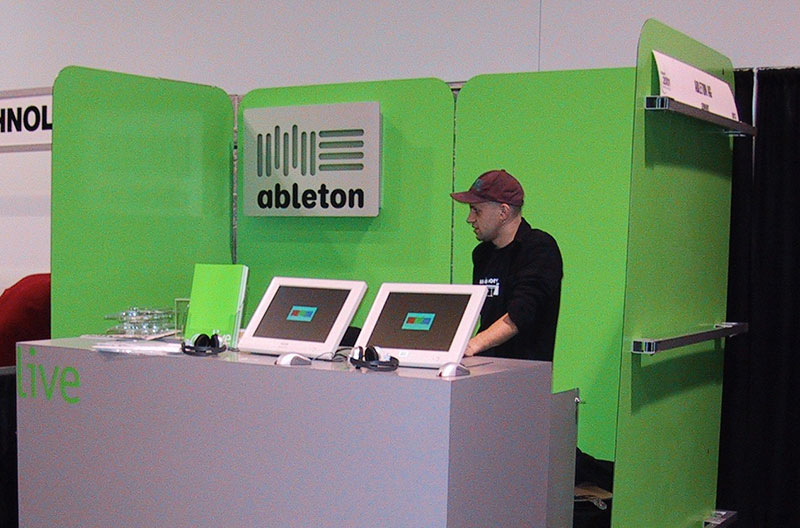 Robert at the Ableton booth, NAMM 2001
Robert at the Ableton booth, NAMM 2001
Future
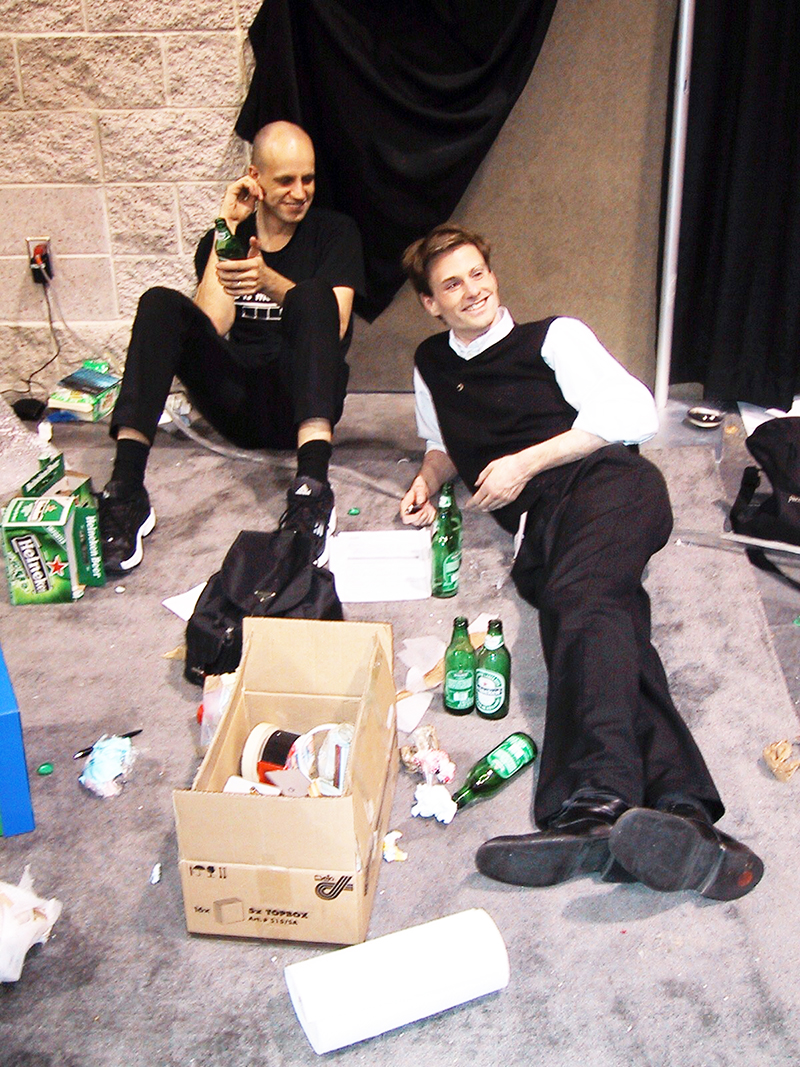 Gerhard and Robert after removing the Ableton booth at NAMM 2001
Gerhard and Robert after removing the Ableton booth at NAMM 2001